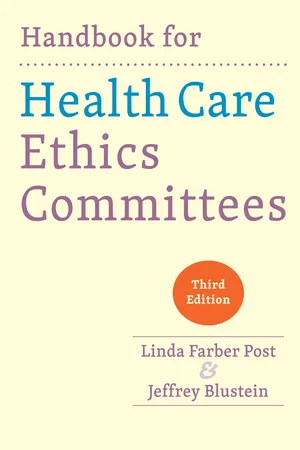
- English
- ePUB (mobile friendly)
- Available on iOS & Android
Handbook for Health Care Ethics Committees
About this book
How can dedicated health care ethics committees increase their effectiveness and demonstrate their value as essential moral resources for their organizations?
Among the most effective and increasingly valued resources in the health care decision-making process is the institutional ethics committee. The Joint Commission (TJC) accredits and certifies more than 19,000 health care organizations in the United States, including hospitals, nursing homes, and home care agencies. As a condition of accreditation, TJC requires health care organizations to have available a standing multidisciplinary ethics committee, composed of physicians, nurses, attorneys, ethicists, administrators, and interested lay citizens. Many of these committees are well meaning but may lack the information, experience, skills, and formal background in bioethics needed to effectively address the range and complexity of the ethical issues that arise in clinical and organizational settings.
Handbook for Health Care Ethics Committees was conceived in 2007 to address the myriad responsibilities assumed by ethics committees. Using sample cases and accessible language, Linda Farber Post and Jeffrey Blustein explored applied bioethics, including informed consent and refusal, decision making and decisional capacity, truth telling, care at the beginning and end of life, palliation, justice in and access to health care services, and organizational ethics.
In the third edition, Post and Blustein have thoroughly updated and reorganized the content and expanded the scope of the material, with special attention to changes in the health care landscape since the second edition was published in 2015. They also focus on communication between and among patients, care providers, and families, the demands of professionalism, the essential role that ethics committees can and should play, and how their effectiveness and value can be assessed. An entirely new chapter examines research ethics. The book also addresses the challenging ethical issues raised by the ongoing COVID-19 pandemic. This guide remains an essential resource for all health care ethics committee and their members.
Frequently asked questions
- Essential is ideal for learners and professionals who enjoy exploring a wide range of subjects. Access the Essential Library with 800,000+ trusted titles and best-sellers across business, personal growth, and the humanities. Includes unlimited reading time and Standard Read Aloud voice.
- Complete: Perfect for advanced learners and researchers needing full, unrestricted access. Unlock 1.4M+ books across hundreds of subjects, including academic and specialized titles. The Complete Plan also includes advanced features like Premium Read Aloud and Research Assistant.
Please note we cannot support devices running on iOS 13 and Android 7 or earlier. Learn more about using the app.
Information
Table of contents
- Front Cover
- Title Page
- Copyright
- Contents
- Preface
- Acknowledgments
- I. Curriculum for Ethics Committees
- II. The Creation, Nature, and Functioning of Ethics Committees
- III. Organizational Codes of Ethics
- IV. Key Legal Cases, Legislation, and State Action
- V. An Ethics Committee Meeting
- Epilogue: Ethics in the Context of a Global Pandemic
- Index